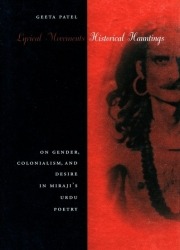
Geeta Patel
Professor of Middle Eastern & South Asian Languages & Cultures and Women, Gender & Sexuality
Middle Eastern & South Asian Languages & Cultures
New Cabell Hall
PO Box 400781
Charlottesville, Virginia 22904-4781
Geeta Patel is a Professor at the University of Virginia, with three degrees in science and a doctorate from Columbia University, NY in inter-disciplinary South Asian Studies (in Sanskrit and Urdu). She has published widely in both academic and popular venues on the collusive conundrums posed by bringing gender, nation, sexuality, finance, science, media, capital, and aesthetics together, and translated lyric and prose from Sanskrit, Urdu, Hindi and Braj. Her first monograph, Lyrical Movements, Historical Hauntings: On Gender, Colonialism and Desire in Miraji’s Urdu Poetry, writes the history of Indian literary modernism through its harbinger Miraji. Lyrical Movements imagines its landscape through Urdu lyric infused with sexuality that takes on the depredations of colonial incursions into literary imaginaries. Dr Patel’s second book, Risky Bodies & Techno-Intimacy: Reflections on Sexuality, Media, Science, Finance, uses techno-intimacy as the locus for interrogating capital, science, media and desire. In Risky Bodies Dr. Patel tunes into science in unexpected ways in order to investigate political economy, nationalism, sexuality, financialization, cinema. She is the co-editor of three special issues that engage several of her areas of expertise. “In Queery/In Theory/ In Deed” and “Area Impossible,” for GLQ and “Trust and Islamic Capital” for Society and Business Review. Dr. Patel is completing several other projects: a manuscript on the Muslim woman writer Ismat Chughtai using the history of scientific realism, light, quantum and special relativity as vectors; a manuscript on fantasies embedded in advertising called “Billboard Fantasies.” She is the completing research for and writing a series of small books on historical pensions, insurance, credit and debt. The first is on the first private public pension fund—the Madras Civil Fund which was started in the late 1700s and whose articulation brought Mughal and European notions of financial compensation together. This book will rewrite the commonly understood history of pensions and the welfare state – relocating it from Europe to India and backdating it by about 100 years. It will also rescript the history of capital. Her current research is on the ways in which the history of bacteriology and our relationship to our own bacterial life produces our everyday sense of nationalism as settler colonialists in our own bodies. Dr. Patel and Meghan Hartman are also compiling a monograph of their new translations of Miraji’s poetry. She has recently begun composing her own lyric under the lockdown in India.
Professor Patel also teaches courses on the following: interdisciplinary methodologies starting with field biology and physics and turning to finance, political economy, aesthetics, architecture, political geography, history, anthropology. Popular culture in South Asia: 1800-present. Bollywood. History of trade, finance and traffic in South Asia—Mohenjodaro-1600s. Poetry, art, music. History of science. Sexuality and cinema in South Asia.
Selected Publications:
Gendering the Global Nation (WomenUnlimited)
Lyrical Movements, Historical Hauntings (Stanford University Press, 2002)

